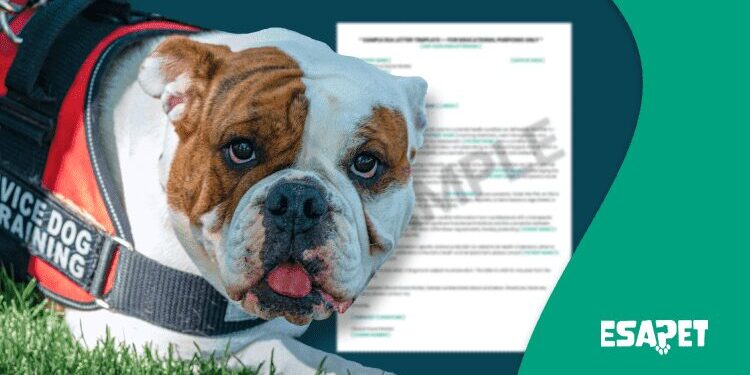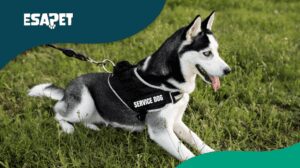Service Dog Registration: Everything You Need to Know

Service dog registration protects the rights of service animal owners under the ADA. However, it’s not supposed to be called that, as proper registration is not something the government issues. To have your dog officially recognized as a Service Dog, you must fit into several requirements, such as having a mental health disability, and training your dog for specific tasks related to your condition.
If qualified, you must obtain a PSD Letter, a legal document that proves your dog is a service animal. It ensures access to public spaces for those with service dogs. Service dogs are trained to assist with disabilities. This guide covers service dog registration, legal requirements, and tips to avoid scams.
Get your Official PSD Letter Consultation from a licensed therapist.
Get PSD Letter NowWhat Are Service Dogs?
Service dogs are specially trained animals that help people with disabilities. They perform tasks that support those with physical or mental health conditions. They might assist someone who has trouble walking. Their assistance allows people to live more independently.
Understanding Service Dog Registration
The service dog registration process involves documenting the dog’s role and training. It serves as a way to ensure access to public spaces for individuals with disabilities. Though it’s not a necessary step on having a Service Animal, registering a service dog helps reinforce their rights under the ADA, allowing them to enter public places.
Clarifying the dog’s purpose helps prevent misunderstandings in public settings. It ensures that service animals are recognized for their role. This can reduce potential challenges and barriers for handlers. It allows them to navigate businesses and public spaces more easily.
ADA Requirements for Service Dog Registration
Under the ADA, no federal law requires service dogs to be registered or certified. The service dog must be trained to perform tasks related to the handler’s disability. While not required, having legal documentation like Service Dog Letters help ease access to public places and transportation.
Is Online Service Dog Registration Reliable?
Not all online service dog registration services are legitimate. Some are scams that offer no legal protection. To avoid this, check if the service aligns with ADA guidelines. Make sure the site provides clear information. Reliable services focus on helping, not just making money.
Legitimate Service Dog Registration and Certification
Service dog certification and registration are not required by law, though they could help ease access to many service dogs rights, like access to public spaces and businesses without confusion.
Certification and registration verify that a service dog has been trained to perform specific tasks that aid their handler’s disability. This step focuses on the dog’s skills and preparedness to assist its handler in daily tasks. They involve documenting the dog’s status as a service animal.
Service dog certification or registration is usually based on issuing a service dog letter and training certificates.
Service Dog Registration Costs
Generally, legitimate registration providers are a bit more expensive than fakes, and the costs of service dog registration can vary. It ranges from $50 to $200, depending on the provider. Additional materials like identification cards or vests, which are optional but can be helpful, might add $20 to $50 more. These items signal the dog’s role in public settings.
Training Costs for Service Dogs
Training a service dog can be expensive, and depend on the type of training needed and the time it takes. However, it is crucial to ensure the dog can properly assist its handler, as they might not be recognized as service animals otherwise.
Although the expenses can be high, many find the investment worth it due to the safety and independence a service dog provides. Service dogs need more than basic obedience. They must learn specific tasks that help with disabilities.
Training includes costs for basic obedience, task-specific training, and public access training, each adding to the expense.
Basic Training Costs
Basic obedience training, which includes commands like “sit” and “stay,” ranges from $100 to $500 for group classes. Prices can be higher for private sessions. Depending on the trainer’s expertise and location, they range from $75 to $200 per hour.
Task-Specific Training Costs
This training teaches the dog skills like alerting the dog to panic attacks or helping with mobility. It can range from $2,000 to $10,000, depending on how complex the tasks are. The time required varies, as some tasks take months to master.
Public Access Training Costs
Public access training helps dogs remain calm in stores and on public transport. It can cost between $1,000 and $5,000. This training ensures the dog can assist the handler in busy environments without getting distracted.
Service Dog Registration Local Regulations
Local regulations for service dog registration can differ from state to state. While federal laws provide general protection, some states may have extra requirements. It’s important to check your state’s specific guidelines to ensure compliance.
Research your state’s regulations to ensure you follow state and federal laws. Some states may need a service dog letter and extra documentation. Others might align closely with federal standards. Knowing both federal and local rules helps avoid complications.
Service Dogs and Housing Rights
Under the Fair Housing Act (FHA), service dog owners have specific rights when it comes to housing. The law requires landlords to allow service dogs, even if there’s a no-pet policy in place. Also, service dog owners are exempt from paying a pet deposit.
To request accommodations, handlers can provide documentation showing the need for their dog. This can include a letter from an LMHP outlining the disability and how the dog assists. Handlers can access housing without extra fees or restrictions by presenting this information.
Traveling with Service Dogs: Policies and Tips
The most important law regulating travel with service dogs is the Air Carrier Access Act (ACAA), which ensures that individuals can bring their service dogs on flights. While ESAs are not covered under this law, the law requires that airlines accept service dogs.
The Americans with Disabilities Act (ADA) grants service dogs access to most public spaces. This means service dogs can go with their handlers wherever the public is allowed.
To travel with a service dog, the carrier staff can only ask if the dog is required for a disability and what tasks it performs.
Learn More About Flying with Service Dogs
The ACAA allows service dogs to fly with their handlers. Airlines may need a DOT Service Animal Air Transportation Form, which verifies that the dog is individually trained and behaves. For long flights over eight hours, airlines can ask how the dog will manage its needs during the journey.
Public Access Laws for Service Dogs
The ADA ensures that service dogs can access public places. Businesses cannot deny entry based on a “no pets” policy. Staff can ask about the dog’s service. However, they cannot demand training proof or task demonstration. Service dog letters are the only legal document that may be required.
Difference Between Service Dogs and Emotional Support Animals
Service dogs and emotional support animals (ESAs) are different in the roles they serve. Among the differences between ESAs and Service Dogs, training is an important aspect.
Service dogs are trained to perform specific tasks related to their handler’s disability, and this is considered when getting legal documentation. An emotional support animal, like a companion dog, is not necessarily trained. These animals provide comfort and emotional support.
Legally, there are also big differences, as service dogs have broader protections under the ADA. It grants them access to public places like stores and restaurants. ESAs are not granted the same access rights under the ADA. However, the FHA covers both types of assistance animals, allowing them to live in housing with their handlers with the help of an ESA Letter.
What Are Psychiatric Service Dogs?
Psychiatric service dogs are specifically trained service dogs that support individuals with mental health conditions and disorders.
According to a study published in the research journal Frontier by Janice Lloyd named “Psychiatric Assistance Dog Use for People Living With Mental Health Disorders”, these dogs help people who experience mental health conditions like “post-traumatic stress disorder (PTSD), schizophrenia, depression, anxiety, or bipolar disorder.”
They are trained to sense changes in their handler’s behavior or physical state, being essential for improving the quality of life for individuals with mental illness. PSDs offer both practical and emotional support.
Benefits of Having a Psychiatric Service Dog
Among the many benefits PSDs provide, the most important are the specific tasks they can do.
Tasks vary and the most common are deep pressure therapy during stressful moments, assisting their handlers during panic attacks, and offering emotional support. Their presence can also help prevent an anxiety attack by providing a calming influence.
Best Breeds for Psychiatric Service Dogs
Certain breeds are well-suited to becoming PSDs due to their intelligence, temperament, and trainability. These breeds are known for being calm, reliable, and intuitive. This makes them excellent companions for individuals with mental illness.










How to Get a Psychiatric Service Dog
To get a PSD, consult an LMHP. They will determine if a service dog is right for your needs. Then, apply through a reputable service dog trainers organization or train the dog yourself. The dog must be trained to perform tasks that support your mental health and meet ADA guidelines.
How to Obtain a PSD Letter
To get a psychiatric service dog (PSD) letter, you must consult an LMHP who will assess your need for a service dog. A PSD Letter is a document provided by a licensed mental health professional. It validates the need for a PSD by confirming the handler’s mental condition and how the dog helps.
Frequently Asked Questions About Service Dog Registration
- How Do I Register My Dog as a Service Animal in the US?
The Americans with Disabilities Act (ADA) does not require service dogs to be registered. However, some handlers register their dog with a reputable service for identification purposes. You need proof of your dog’s training and a letter from an LMHP to register. - How Can You Tell a Real Service Dog From a Fake?
A real service dog is trained to perform specific tasks related to its handler’s disability. These dogs remain calm, obedient, and focused in public spaces. Fake service animals often lack obedience, may act aggressively, or show signs of distress in public settings. - Can Someone Ask Me for Papers on My Service Dog?
Under the ADA, public businesses can ask whether the dog is required because of a disability and what tasks the dog is trained to perform. They cannot request any documentation, proof of training, or information about your disability. - Is USA Service Dog Registration Legitimate?
Yes. USA Service Dog Registration offers services. However, it’s important to remember that the law does not require service dog registration. Choosing a reputable organization is crucial, as some services may be scams.
Contact ESA Pet for Assistance
ESA Pet offers guidance and resources if you need help with service dog registration, certification, or related documentation. Reach out to ESA Pet to ensure you have the right documents and support for your service dog needs.
Conclusion
Service dog registration is essential for protecting the rights of individuals who rely on these animals. While not required by law, legitimate registration can ease access to public spaces. Thoroughly research and use only reputable resources when registering your service animals.





